Abstract
Athymic (nude) mice, their normal littermates, and Swiss white mice were infected with 750 oocysts of Eimeria falciformis var. pragensis and reinfected twice with 20,000 oocysts, 20 and 40 days after the primary infection. The prepatent and patent periods of the primary infection were similar in each group of mice; however, the athymic mice discharged more oocysts. The normal littermates and Swiss white mice developed immunity to the parasite after the first or second infection, whereas the athymic mice never developed immunity. Infection with E. falciformis var. pragensis induced the production of antibodies in the normal littermates and Swiss white mice, whereas antibody production was impaired in athymic mice. Passive administration of immune serum did not protect athymic mice from reinfection by the parasite. Immunity to the parasite was thymus dependent, and "effector" T-lymphocytes seemed to be required for protection.
Full text
PDF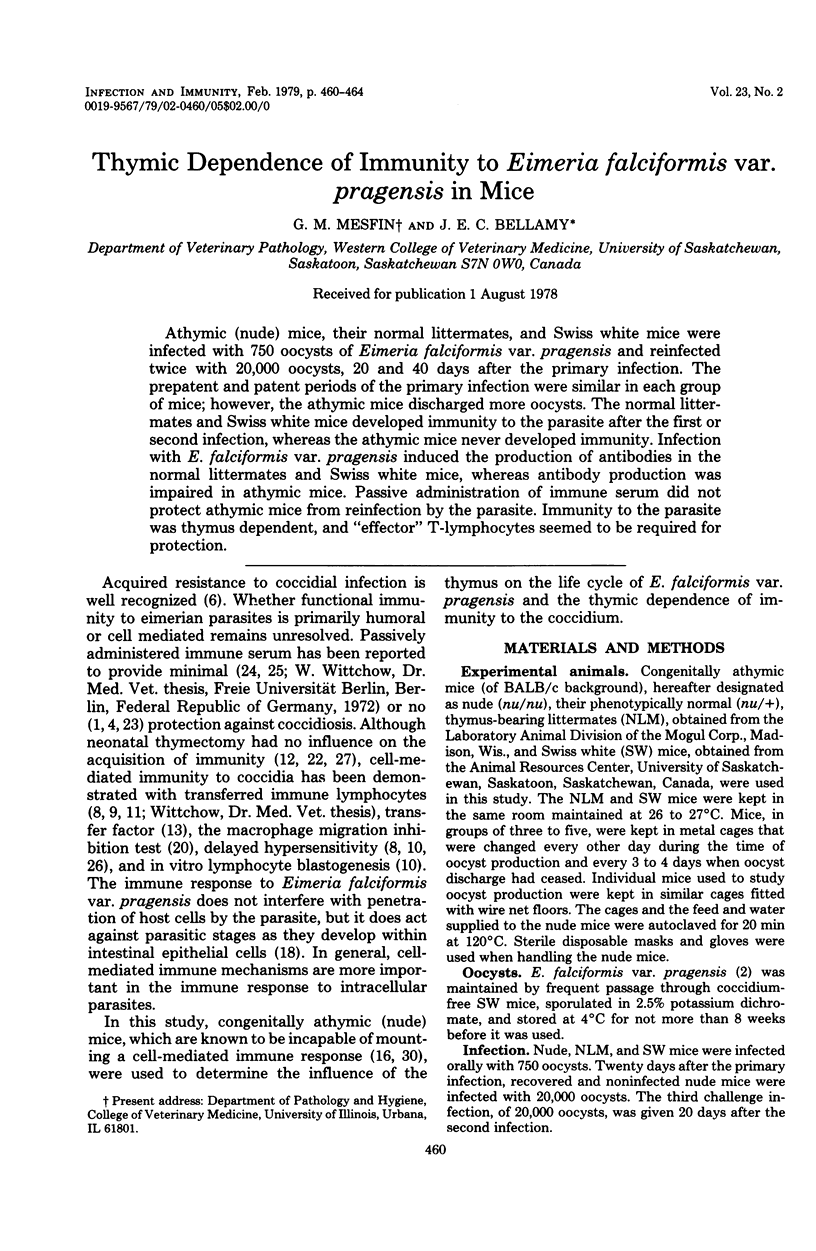
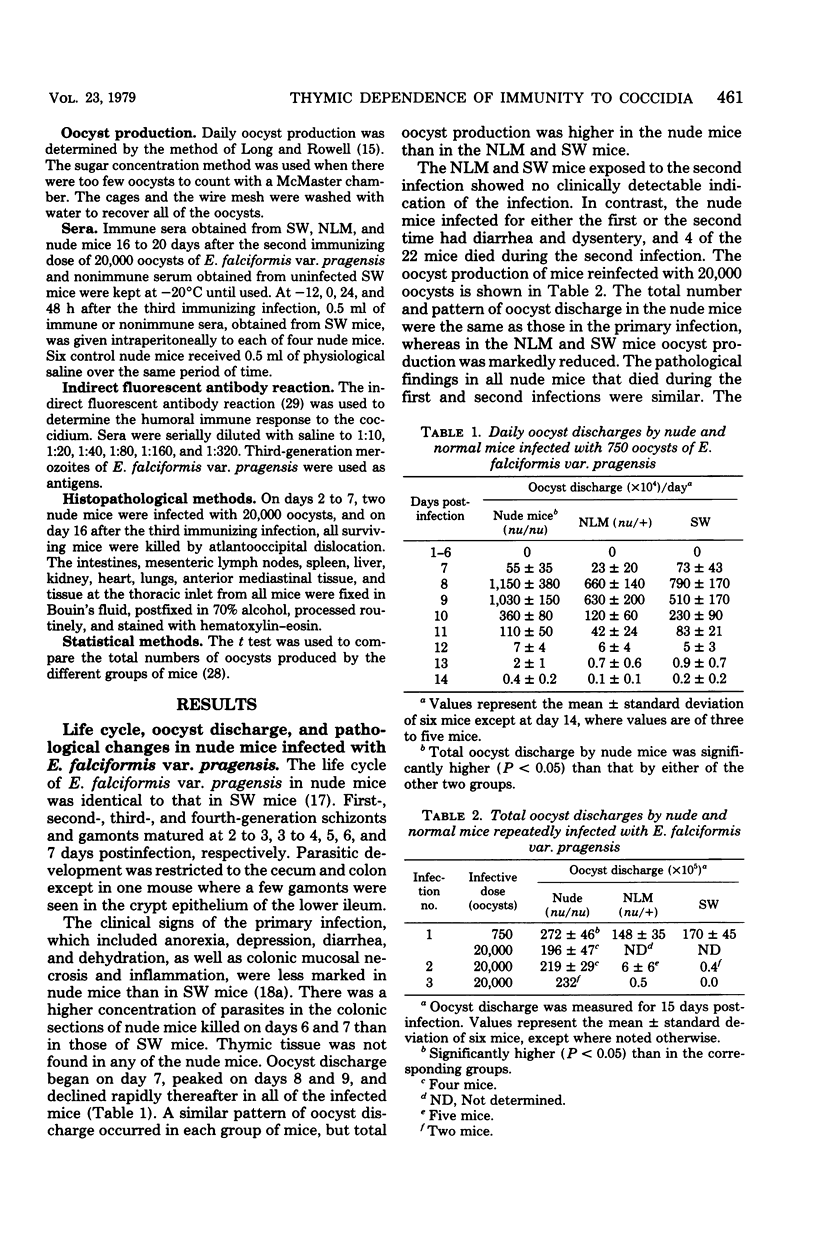
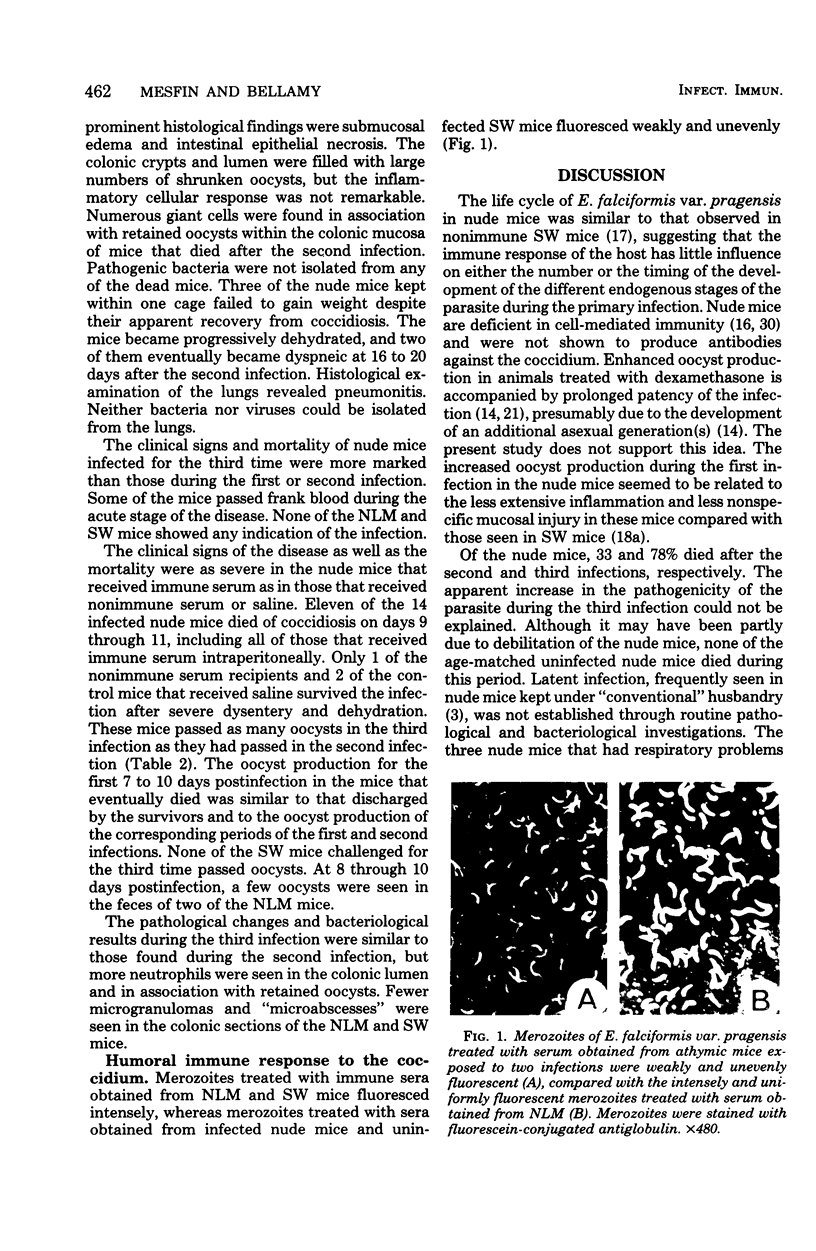
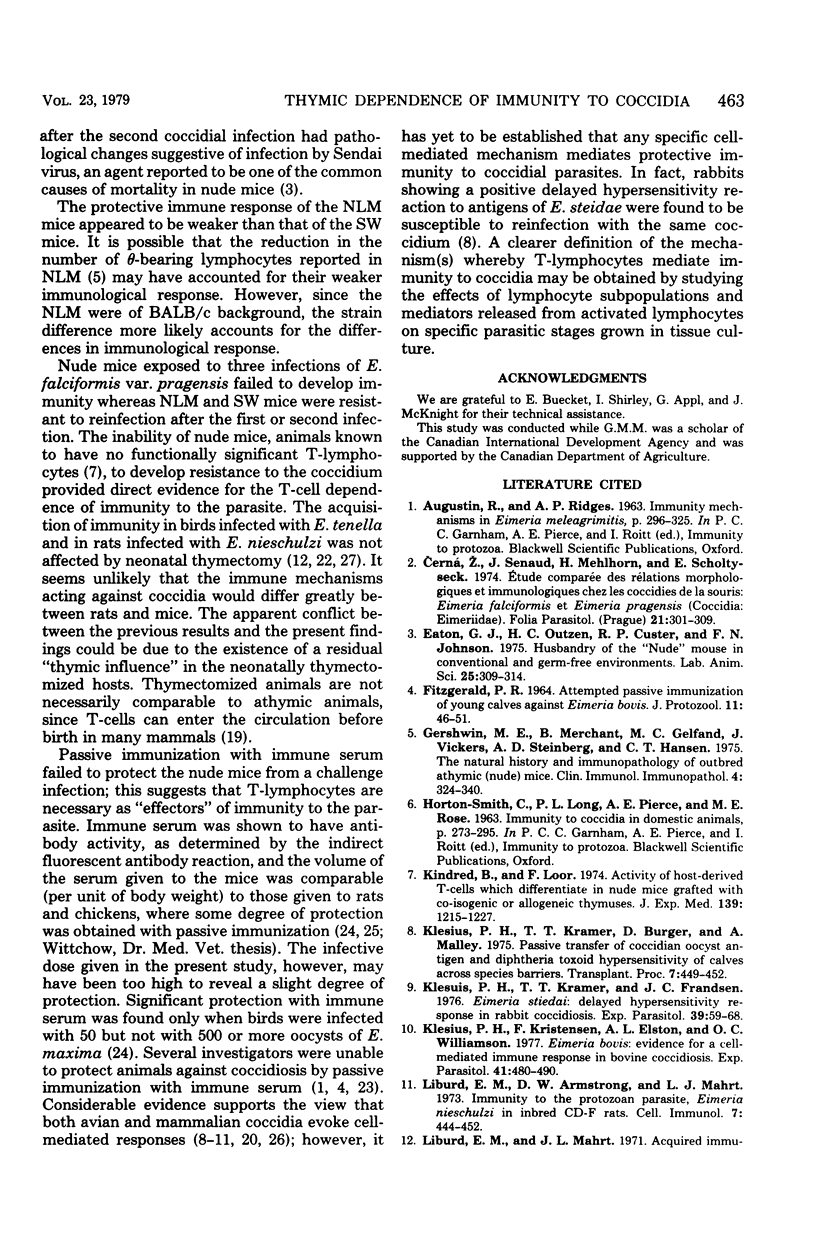
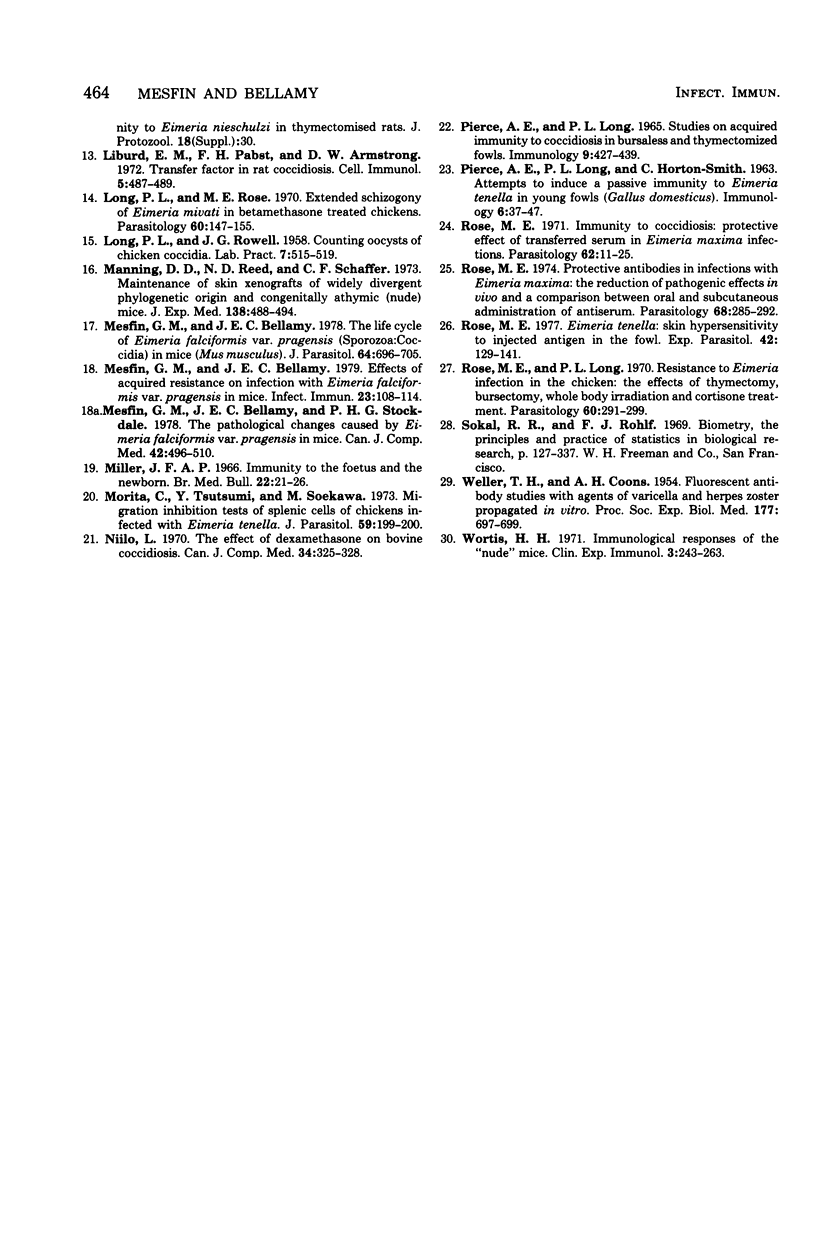
Images in this article
Selected References
These references are in PubMed. This may not be the complete list of references from this article.
- Cerná Z., Sénaud J., Mehlhorn H., Scholtyseck E. Etude comparée des rélations morphologiques et immunologiques chez les coccidies de la souris: Eimeria falciformis et Eimeria pragensis (Coccidia, Eimeriidae) Folia Parasitol (Praha) 1974;21(4):301–309. [PubMed] [Google Scholar]
- Eaton G. J., Outzen H. C., Custer R. P., Johnson F. N. Husbandry of the "nude" mouse in conventional and germfree environments. Lab Anim Sci. 1975 Jun;25(3):309–314. [PubMed] [Google Scholar]
- FITZGERALD P. R. ATTEMPTED PASSIVE IMMUNIZATION OF YOUNG CALVES AGAINST EIMERIA BOVIS. J Protozool. 1964 Feb;11:46–51. doi: 10.1111/j.1550-7408.1964.tb01719.x. [DOI] [PubMed] [Google Scholar]
- Gershwin M. E., Merchant B., Gelfand M. C., Vickers J., Steinberg A. D., Hansen C. T. The natural history and immunopathology of outbred athymic (nude) mice. Clin Immunol Immunopathol. 1975 Sep;4(3):324–340. doi: 10.1016/0090-1229(75)90002-1. [DOI] [PubMed] [Google Scholar]
- Kindred B., Loor F. Activity of host-derived T cells which differentiate in nude mice grafted with co-isogenic or allogeneic thymuses. J Exp Med. 1974 May 1;139(5):1215–1227. doi: 10.1084/jem.139.5.1215. [DOI] [PMC free article] [PubMed] [Google Scholar]
- Klesius P. H., Kramer T. T., Frandsen J. C. Eimeria stiedai: delayed hypersensitivity response in rabbit coccidiosis. Exp Parasitol. 1976 Feb;39(1):59–68. doi: 10.1016/0014-4894(76)90010-2. [DOI] [PubMed] [Google Scholar]
- Klesius P. H., Kramer T., Burger D., Malley A. Passive transfer of coccidian oocyst antigen and diphtheria toxoid hypersensitivity in calves across species barriers. Transplant Proc. 1975 Sep;7(3):449–452. [PubMed] [Google Scholar]
- Klesius P. H., Kristensen F., Elston A. L., Williamson O. C. Eimeria bovis: evidence for a cell-mediated immune response in bovine coccidiosis. Exp Parasitol. 1977 Apr;41(2):480–490. doi: 10.1016/0014-4894(77)90120-5. [DOI] [PubMed] [Google Scholar]
- Liburd E. M., Armstrong W. D., Mahrt J. L. Immunity to the protozoan parasite Eimeria nieschulzi in inbred CD-F rats. Cell Immunol. 1973 Jun;7(3):444–452. doi: 10.1016/0008-8749(73)90208-6. [DOI] [PubMed] [Google Scholar]
- Liburd E. M., Pabst H. F., Armstrong W. D. Transfer factor in rat coccidiosis. Cell Immunol. 1972 Nov;5(3):487–489. doi: 10.1016/0008-8749(72)90075-5. [DOI] [PubMed] [Google Scholar]
- Long P. L., Rose M. E. Extended schizogony of Eimeria mivati in betamethasone-treated chickens. Parasitology. 1970 Feb;60(1):147–155. doi: 10.1017/s0031182000077313. [DOI] [PubMed] [Google Scholar]
- Manning D. D., Reed N. D., Shaffer C. F. Maintenance of skin xenografts of widely divergent phylogenetic origin of congenitally athymic (nude) mice. J Exp Med. 1973 Aug 1;138(2):488–494. doi: 10.1084/jem.138.2.488. [DOI] [PMC free article] [PubMed] [Google Scholar]
- Mesfin G. M., Bellamy J. E. Effects of acquired resistance on infection with Eimeria falciformis var. Pragensis in mice. Infect Immun. 1979 Jan;23(1):108–114. doi: 10.1128/iai.23.1.108-114.1979. [DOI] [PMC free article] [PubMed] [Google Scholar]
- Mesfin G. M., Bellamy J. E., Stockdale P. H. The pathological changes caused by Eimeria falciformis var pragensis in mice. Can J Comp Med. 1978 Oct;42(4):496–510. [PMC free article] [PubMed] [Google Scholar]
- Mesfin G. M., Bellamy J. E. The life cycle of Eimeria falciformis var. pragensis (Sporozoa: Coccidia) in the mouse, Mus musculus. J Parasitol. 1978 Aug;64(4):696–705. [PubMed] [Google Scholar]
- Miller J. F. Immunity in the foetus and the new-born. Br Med Bull. 1966 Jan;22(1):21–26. doi: 10.1093/oxfordjournals.bmb.a070431. [DOI] [PubMed] [Google Scholar]
- Morita C., Tsutsumi Y., Soekawa M. Migration inhibition test of splenic cells of chickens infected with Eimeria tenella. J Parasitol. 1973 Feb;59(1):199–200. [PubMed] [Google Scholar]
- Niilo L. The effect of dexamethasone on bovine coccidiosis. Can J Comp Med. 1970 Oct;34(4):325–328. [PMC free article] [PubMed] [Google Scholar]
- PIERCE A. E., LONG L. P., HORTON-SMITH C. Attempts to induce a passive immunity to Eimeria tenella in young fowls (Gallus domesticus). Immunology. 1963 Jan;6:37–47. [PMC free article] [PubMed] [Google Scholar]
- Pierce A. E., Long P. L. Studies on acquired immunity to coccidiosis in bursaless and thymectomized fowls. Immunology. 1965 Nov;9(5):427–439. [PMC free article] [PubMed] [Google Scholar]
- Rose M. E. Eimeria tenella: skin hypersensitivity to injected antigen in the fowl. Exp Parasitol. 1977 Jun;42(1):129–141. doi: 10.1016/0014-4894(77)90070-4. [DOI] [PubMed] [Google Scholar]
- Rose M. E. Immunity to coccidiosis: protective effect of transferred serum in Eimeria maxima infections. Parasitology. 1971 Feb;62(1):11–25. doi: 10.1017/s0031182000071249. [DOI] [PubMed] [Google Scholar]
- Rose M. E., Long P. L. Resistance to Eimeria infections in the chicken: the effects of thymectomy, bursectomy, whole body irradiation and cortisone treatment. Parasitology. 1970 Apr;60(2):291–299. doi: 10.1017/s0031182000078124. [DOI] [PubMed] [Google Scholar]
- Rose M. E. Protective antibodies in infections with Eimeria maxima: the reduction of pathogenic effects in vivo and a comparison between oral and subcutaneous administration of antiserum. Parasitology. 1974 Jun;68(3):285–292. doi: 10.1017/s0031182000045819. [DOI] [PubMed] [Google Scholar]
- Wortis H. H. Immunological studies of nude mice. Contemp Top Immunobiol. 1974;3:243–263. doi: 10.1007/978-1-4684-3045-5_10. [DOI] [PubMed] [Google Scholar]



